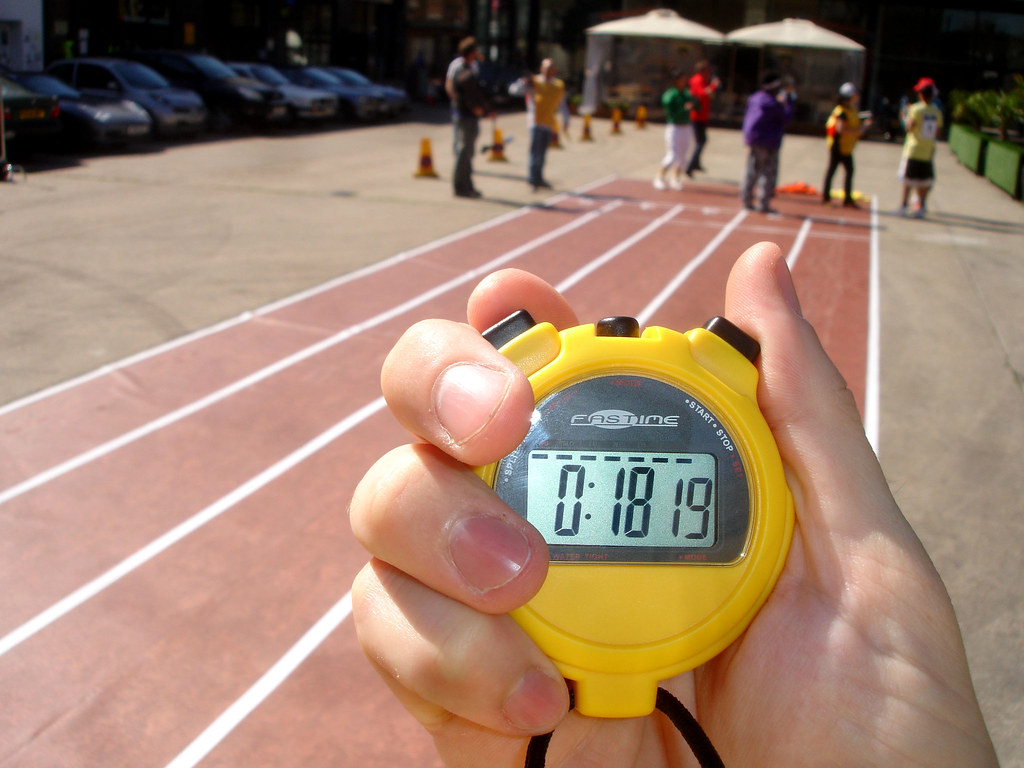Past Time
When the gun goes off, the stopwatch starts. When the finish line is crossed, the stopwatch stops. And when the stopwatch stops, we know who is the best. But do we really? Does that single number truly tell the whole story? Is something lost in using time as a singular reference point for performance?
Time as we know it – splicing up a day into so many hours, so many seconds – is an invention of modern humanity which has enabled much of our current lifestyle. The rising and setting sun and the change of the seasons have always been used for general approximations, but as our need for coordination and efficiency increased, particularly during the industrial revolution, so too did our thirst to develop more precise measurements of time. A few million years ago, no one would have looked at their brother askance if he arrived back at the cave from the swimming hole eleven minutes later than the others in the clan. Now, at the frenetic pace of daily life, lateness is a social taboo, as the offender is effectively robbing those who are punctual of precious moments which might have translated to a quick errand or phone call with a friend, but have instead passed in maddening emptiness.
Beyond other practical applications, hyper-specific time measurement has emerged as the end-all, be-all metric for measuring performance in the sporting world. Its value as such lies in two qualities: objectivity and convenience. You can argue with an opinion; you can’t argue with the clock. That number is solid as granite, and its availability as a singular reference point for all the years of an athlete’s training, of self-doubt and hardship and triumph, enables us as consumers to skate over the details and accept the result in a neat package. 4:01.34 seconds is less than 4:03.11, ergo, Athlete A is better than Athlete B. Clear as a bell. Yet there is a glaring problem with this approach: it is reductive and degrades our appreciation for nuance.
As trail runners, we are intimately familiar with how subjective the experience of time can be. The obvious example of this is that the higher the effort level, the longer time seems to stretch, like taffy; two minutes at VO2 Max can seem unbearable, whereas two minutes cruising on a recovery run is trivial. Many other factors serve to influence our experience as well, such as mood, weather, and overall fitness.Yet there also remains some element of mystery. On any given day, a run which ought to be routine might feel endless, whereas on another day, pure flow leaves you feeling outside time completely, as though you’ve passed through some invisible membrane.
In itself, this does not really pose a problem; in fact, such subjectivity is what time measurement was intended to eliminate. Outwardly, the clock can remain consistent, even as our experience varies. But in erasing that experience, the subtext is that it does not matter, that it is inherently valueless. It refocuses attention away from the athlete and flattens all of the richness of humanity in sport for the purposes of comparing and contrasting.
Such a perspective can seep into and poison conversations – even those at the national level – and deliver real-world consequences. For example, for years, viewership of women’s professional track and field – and for women’s professional sports across the board – has been lower than it has been for men’s. While there are many forces at play here, a paraphrased justification for viewing habits which I have heard on multiple occasions is this: “Why would I watch the women run if the men run faster?” In many instances, this is simply a veneer to hide naked sexism, yet I would also argue that this perspective is often a byproduct of our conflation of time and raw performance with value. The clock is the centerpiece of any such broadcast. It has its own designated area on the screen so that we can look at the athlete, then the number, then the athlete, and feel the twist of anticipation as we extrapolate their speed to predict whether they’ll break the record, or sneak under four minutes for the mile. We are actively conditioned to treat the entire race as simply a leadup to the grand reveal of the numbers that pop up once the athletes cross the finish line. A woman can train harder and race smarter than their male counterpart, but we’re led to believe we shouldn’t care if their time at some distance is not as fast.
I invite you to participate in a quick thought experiment. Suppose we removed clocks from sports broadcasts entirely. Yes, even track and field. Would people still see such a stark contrast between the women’s and men’s competition? Or would it reorient them to see what they’ve been missing all along: the effort, the determination, the subtleties of the strategy which unfurls after the gun goes off. By removing the clock, broadcasters would be making a statement that the experience of the athlete, and their humanity, are what is truly central. While one athlete may have a faster finishing time than another, it may be that the one who finished second, or even last, made the greater effort. Maybe their experience of the elapsed time of the 1500 meter was longer and more arduous than that of the winner, despite their running roughly the same clock time. And perhaps, in a small way, instances like this would undercut our obsession with time, and remind us of how it takes more than numbers to define a champion.
At the end of the day, someone has to take a medal home. Time ought not be fully demonized. It is a useful heuristic for measuring an athlete’s ability, and the best enabler of fair competition we have yet invented. Subjective factors, such as effort, can never, by their nature, be determinative of who wins and who loses. Just the same, when time’s objectivity is overvalued and its convenience abused, it leaches away our appreciation for the athlete’s journey.
Many trail runners – myself included – would present our community, and our approach to the sport, as exemplary. Finishing time is one thing, but it’s not the only thing. Golden Hour on the Western States course is just as special as when the women’s and men’s winners break the tape. Each finisher is celebrated and valued, their journey seen as unique. The humanity of this approach is what defines our sport. If there is a way to import this ethos into other sports and other forms of competition, then it would surely bleed into society at large. How exactly this might be accomplished, I’m not sure. But I do know that it is past time that we re-examine our relationship with time.
~Vincent Behe
Add Comment
You must be logged in to post a comment.







